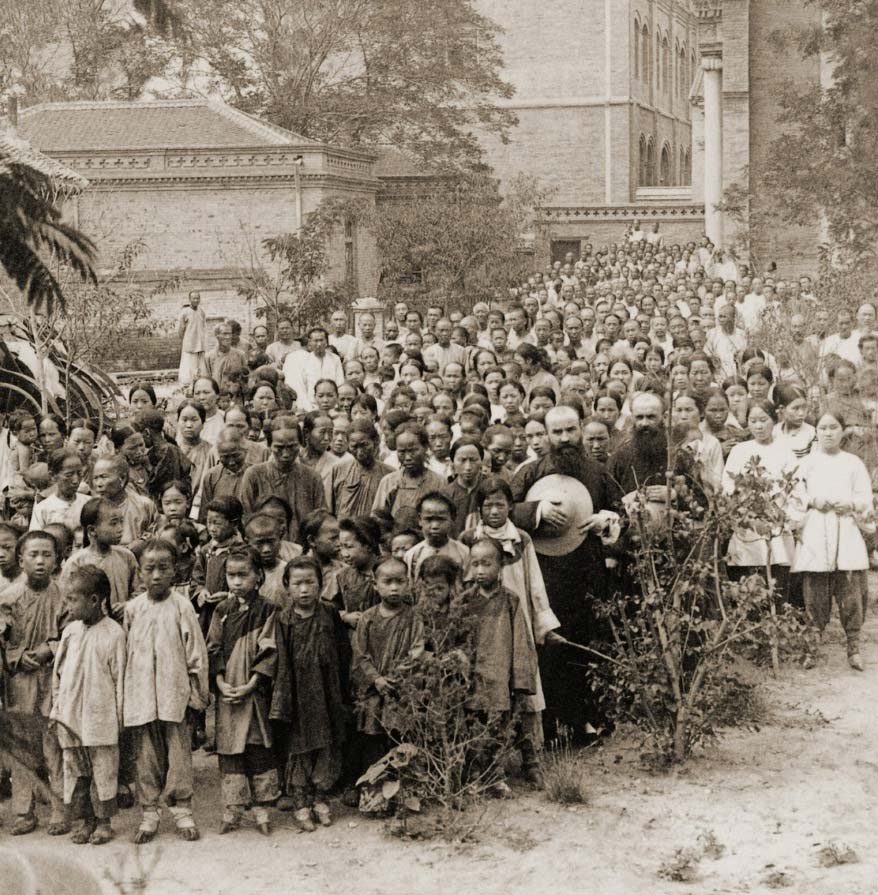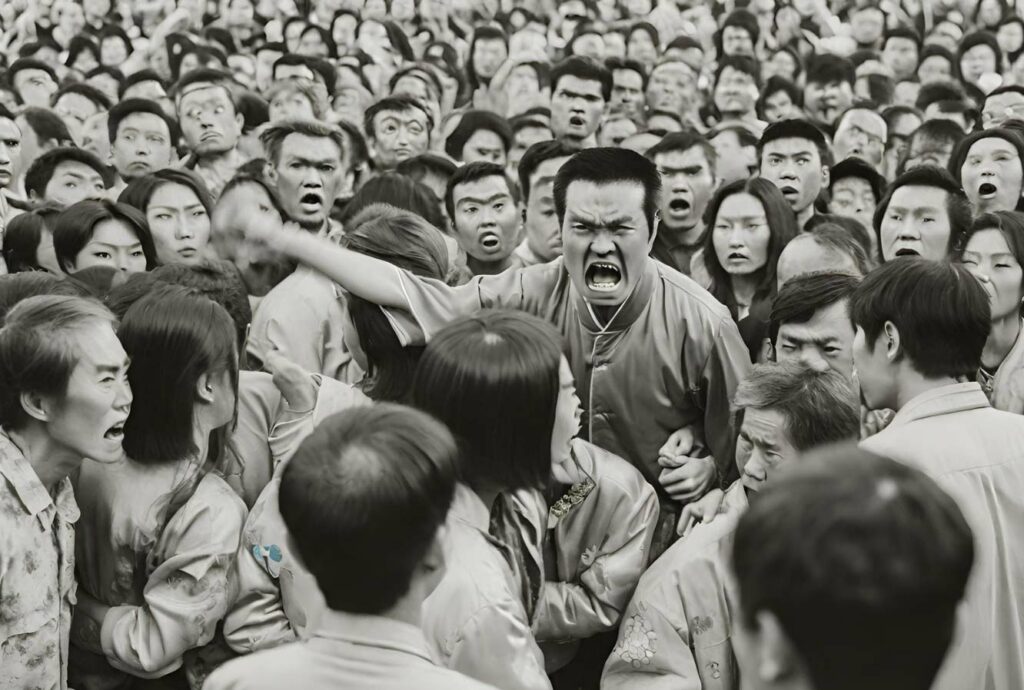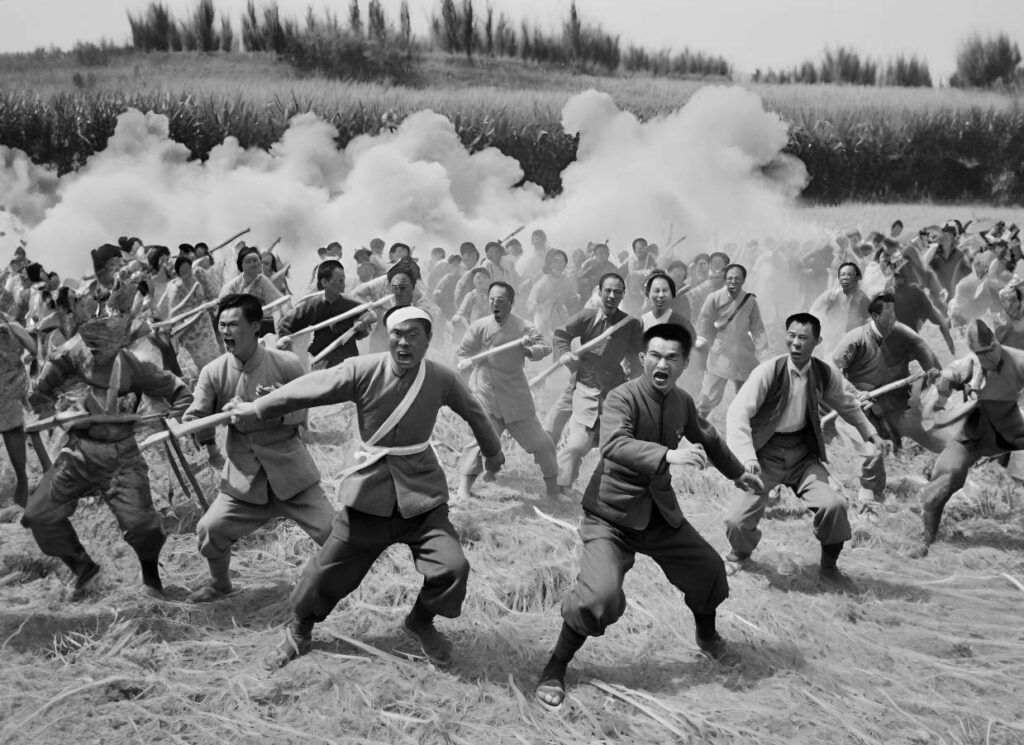The Boxer Rebellion in simple terms
The Boxer Rebellion was a big conflict that happened in China from 1899 to 1901. It was like a fight between two groups of people. On one side, there were the Boxers, who were Chinese people that didn’t like foreigners being in their country. They were upset because they thought the foreigners were changing their traditions and taking over their land. On the other side, there were foreign countries like the United States, Britain, and others. They didn’t want the Boxers to harm their people or businesses in China.

Background of the Boxer Rebellion (1899-1901)
Before the war, China was going through a tough time. Many people were poor, and foreign countries had taken control of some parts of China. This made some Chinese people really angry. The Boxers believed that they had special powers that could protect them from bullets and harm. They thought they could get rid of the foreigners and make China strong again.
Causes of the War
The main cause of the war was the anger and frustration of the Boxers towards foreigners and foreign influence in China. They felt like their country was being changed by outsiders, and they wanted to stop that. Some of the underlying issues were economic problems and a lack of understanding between the Chinese and foreigners.
Foreign Influence and Resentment
One of the biggest reasons behind the Boxer Rebellion was the increasing foreign influence in China. During the 19th century, many Western countries, like Britain, France, and Germany, and even Japan, began to establish a strong presence in China. They took control of certain areas, called concessions, and influenced Chinese politics and economy. This made the Boxers, who were often peasants and workers, very angry. They saw these foreigners as changing their way of life and taking away their jobs and land.
Economic Problems
China was going through a tough time economically. There were droughts, famines, and economic hardships that affected many Chinese people. The Boxers believed that these problems were partly caused by the foreign presence in China. They blamed the foreigners for exploiting China’s resources and making their lives harder.
Cultural Clash
The Boxers felt like their culture and traditions were under threat. They were often followers of Chinese folk religions and believed that they had special powers, like being able to resist bullets. They thought that these powers would help them get rid of the foreigners who they believed were disrupting their way of life. This cultural clash between traditional Chinese beliefs and Western influence fueled the anger of the Boxers.
Lack of Understanding
There was also a significant lack of understanding and communication between the Chinese and foreigners. This misunderstanding made the situation worse. The Chinese and foreigners often saw each other as strange and different, which led to mistrust and conflict.
Weakness of the Chinese Government
The Chinese government at the time was relatively weak and divided. It struggled to control the Boxers and prevent them from attacking foreigners. In some cases, there were officials who secretly supported the Boxers, while others tried to maintain good relations with the foreign powers. This lack of a united government response made the situation more chaotic.
The Boxer Rebellion was primarily caused by the Boxers’ anger towards foreign influence, economic hardships, a clash of cultures, a lack of understanding, and the weakness of the Chinese government. These factors combined to create a volatile situation that eventually led to a violent conflict between the Boxers and foreign powers in China.

Major Events & Turning Point
During the war, there were many fights and battles in China. The Boxers attacked foreigners and Chinese Christians, and the foreign countries sent soldiers to protect their people. One big turning point was when the foreign countries joined forces and sent a big army to Beijing, which was the capital of China. They fought against the Boxers and took control of Beijing.
International Involvement & Reactions
Foreign countries formed alliances to help each other in the war. They also held meetings to decide what to do about the Boxers. Some countries condemned the Boxers’ actions. It was one of the first times that different countries came together to work against a common enemy in China.
Alliances and Joint Action
Many foreign countries had citizens and businesses in China, and they were concerned about the safety of their people and interests. To protect their nationals and assets, these countries formed alliances. The most notable alliance was called the Eight-Nation Alliance, which included countries like the United States, United Kingdom, France, Germany, Russia, Japan, Italy, and Austria-Hungary. These nations joined forces and sent military troops to China to put down the Boxer Rebellion.
Military Intervention
The Eight-Nation Alliance’s joint military action was a significant response to the Boxer Rebellion. They sent a large army to China, which played a crucial role in quelling the rebellion. This military intervention was a coordinated effort to protect their citizens and ensure their economic interests in China. It marked one of the first instances of several Western and Asian nations working together militarily in a foreign conflict.
International Diplomacy
Alongside military action, there were diplomatic efforts to resolve the crisis. Diplomats from various nations met to discuss their approach to the Boxer Rebellion. They sought to find a peaceful solution but were prepared to use force if necessary to protect their interests and citizens. These diplomatic discussions highlighted the growing importance of diplomacy and international cooperation in addressing global issues.
Condemnation and Support
Different countries had varying reactions to the Boxer Rebellion. Some nations, like the United States, condemned the Boxers’ actions and supported the international intervention to protect their citizens. Others, particularly those with imperialistic ambitions in China, may have seen the Boxers as a convenient tool to further their own interests and did not condemn their actions. The varying reactions reflected the complex geopolitical landscape of the time.
International Organizations
While there were no international organizations like the United Nations during this period, the Boxer Rebellion set a precedent for nations coming together to address common threats. This cooperation laid the groundwork for future international organizations and alliances that would play significant roles in the 20th century, such as the League of Nations and later the United Nations, which were created to promote peace and cooperation among nations.
The international involvement and reactions to the Boxer Rebellion demonstrated how nations could form alliances and work together to protect their interests and citizens in a foreign conflict. It also foreshadowed the development of international diplomacy and organizations that would play critical roles in shaping the 20th-century world order.
Consequences & Aftermath
Many people died during the war, both Chinese and foreigners. China’s economy suffered, and there was a lot of damage to buildings and infrastructure. After the war, China had to pay a lot of money to the foreign countries as a punishment.

Legacy & Long-Term Impact
The Boxer Rebellion changed how China interacted with the rest of the world. It made China weaker and more controlled by foreign countries for a while. But it also made Chinese people more determined to take control of their own country later on. The Boxer Rebellion is an important part of China’s history.
The Boxer Rebellion was a big fight in China that happened because of anger towards foreigners and foreign influence. It had a lasting impact on China’s relationship with the world and the desire of the Chinese people to have control over their own country. It’s a reminder of how important it is for countries to understand and respect each other’s cultures and traditions.
Back to the Wars section